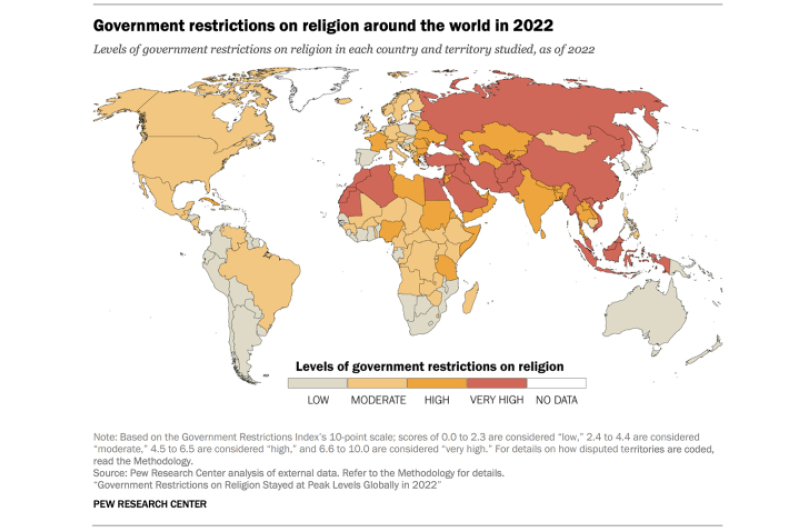
The Pew Research Center has released its 15th annual Global Restrictions on Religion report, highlighting the pressing challenges to religious freedom worldwide. The report identifies Egypt, Syria, Pakistan, and Iraq as the countries with the most severe restrictions on religious freedom, driven by both government limitations and societal hostility. Religious minorities in these nations face compounded pressures in practicing their faith.
Government Restrictions and Societal Hostilities Go Hand-in-Hand
The report notes that government restrictions on religion often align with societal hostility. Pew researchers used two indices—the Government Restrictions Index (GRI) and the Social Hostilities Index (SHI)—to assess the state of religious freedom in 198 countries. The GRI measures 20 types of government-imposed restrictions, such as bans, conversion limits, and favoritism toward certain religions. The SHI evaluates 13 forms of societal hostility, including mob violence and hate crimes against religious groups.
Egypt, Syria, and Other Countries with the Harshest Religious Environments
The data shows that 24 countries scored 4.5 or higher on the 10-point GRI scale, with SHI scores exceeding 3.6. Egypt, Syria, Pakistan, and Iraq topped the list, reflecting dire conditions for religious minorities. For instance, Iraq's societal hostility score rose due to increased violence by militia groups targeting religious minorities. A 2024 Amnesty International report also highlighted several cases of killings of women who converted in Iraq's Kurdistan region.
India, Israel, and Nigeria follow closely behind, marked by religious tensions and violence. Nigeria, in particular, faces some of the highest levels of societal hostility, largely due to ongoing violence by Boko Haram and the Islamic State’s West Africa Province.
Religious Freedom Under Authoritarian Regimes
Notably, countries like China and Cuba scored high on government restrictions but low on societal hostility, reflecting their authoritarian governance. These 32 nations were classified as "undemocratic" or "authoritarian regimes." The report emphasizes that these governments often use strict religious controls as an extension of broader restrictions on civil liberties. For example, China's policies in Tibet have displaced approximately 26,000 people.
A Rise in Violent Incidents
The report reveals that 145 countries experienced harassment of religious groups in 2022, up from 137 in 2021. Such harassment included expulsions, violent attacks, and property damage. Notable cases include gang violence in Haiti and persecution of religious groups in China.
This comprehensive analysis underscores the ongoing and multifaceted challenges to global religious freedom.







